Two heads are better than one and three are better than two and so on; many hands make light work. The benefits behind the ability of “the many” may seem obvious at first glance, as it is apparent that tasks can be accomplished quicker in such a manner, but it is extremely rewarding when you observe the merit beyond dexterity and efficiency. When one takes into consideration the quality possible through cooperation and the growth possible to each party afterwards, the weight of collaboration becomes extremely apparent. Collaboration exists as one of the most powerful devices in human existence. Its weight has been constantly reinforced and acknowledged throughout history—some might even argue it a quintessential aspect or defining characteristic of humanity, as most substantial progress in this world has been realized through years and years of collaboration between a multitude of people passing on and exchanging information. This level of collaboration that expands beyond temporal boundaries or physical space is commonly observable through notated literature. Toni Morrison’s trilogy, specifically the novel Paradise, reinterprets some of the material from Dante’s The Divine Comedy and provides several layers of collaboration within and without (between the authors’ writing and the characters’ of her novel) the text that reveal the long lasting benefits of collaboration. Morrison’s novel allows for a modern perspective of some of the material from Dante’s Paradiso, offering a conversation on the justice system and the long lasting difficulties pushed onto African Americans within the United States as a result of slavery, injustice, discrimination and exclusion. Continue reading “The Limitations of Collaboration Revealed Through Morrison’s Trilogy and The Divine Comedy”
The Reality of Literary Sin and Consequence
By: Ashley Daddona, Allie Flanagan, Katie Haefele, Denis Hartnett, Margaret Hall, Brian Vargas, and Quentin Wall
There is often a line when representing real life concepts in literature. Literature allows the reproduction of complicated systems in life that are far more chaotic and unorganized in the physical world outside of literature; furthermore, it enables the establishment of heavily systematic devices to represent these systems/concepts that exist in reality, because of the qualities of fiction which remove the boundaries of non-fiction in regards to complete control over creation in a story. One particularly large life concept that is often represented in literature is that of sin and its subsequent consequence; this is one of the main principles in Italian poet Dante Alighieri’s epic Divine Comedy, particularly the Inferno—in this work, it is Hell and its nine circles that function as a representation of sin and consequence in reality. Continue reading “The Reality of Literary Sin and Consequence”
Final Reflection Essay INTD 288 – Perspective and Position
Perspective and Position: The Connotation of The World
There are two essential parts of perspective: the position and placement of what we see and the interpretation of what we see—the two parts work together and it is often the case that people manipulate the placement in their work in order to produce an audience interpretation within the range of their desire. In order to create a specific impression for their audience who will be experiencing, artists and individuals take extreme care in their choice of placement in their work or in themselves.
This manipulation with perspective is commonly observed in visual art; a visual artist has complete control of the placement on their canvas, which displays a single moment—this depiction of a single moment is different than the series of moments that happen in our real lives and cannot be revisited in real time, making art an excellent example of perspective and manipulation. With the manipulation of placement in a composition, an artist hopes to create their desired impressions and general interpretation of the piece upon the audience. Art compositions are often described as something that will push people to think beyond the artist’s intentions and discern their own interpretation, but the artist’s intention also holds significant weight. This importance of intention is supported by the artist Steve Prince’s work, both through his enjoyment of listening to our class interpretations of his work and his confirmation of certain meanings and intentions behind his work. Continue reading “Final Reflection Essay INTD 288 – Perspective and Position”
Collaboration
Among the most powerful abilities humans have exists the teamwork, community, and collaboration. When people come to work together, they both produce a sufficient result and in the process of that result, experience the wonders of teamwork, developing their collaborative and individual skills and often building fantastic bonds.
community, and collaboration. When people come to work together, they both produce a sufficient result and in the process of that result, experience the wonders of teamwork, developing their collaborative and individual skills and often building fantastic bonds.
While individuals are certainly able to function to their best ability through their own endeavor and hard work, there are limitations present in the ability of a single person. Teamwork is beneficial in terms of its efficiency and also in the subsequent removal of stress when one can rely on another. There are several complications that may arise in an individual’s attempt to complete daily work, especially in the attempt to manage all of their course load in an often-stressful environment like a college campus. Collaboration is an answer. Continue reading “Collaboration”
Life is us Constantly Improvising
We are always and constantly improvising; improvisation is one of the ways we experience, grow, and how we survive and how the people of our history have survived—to improvise is to create from almost nothing, read your environment, and ride the process.
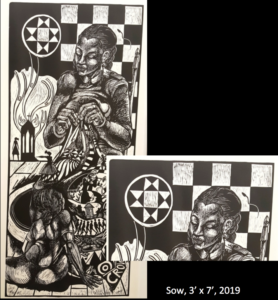
Improvisation is an especially important part of expression in art and music, as many witnessed Steve Prince whom emphasized the process and showed us his improvisatory sketch of our classmate Amina—there was even an excellent display of improvisation between Steve Prince and Herb Smith and his Freedom Trio at the end of the Urban Garden project in the SUNY Geneseo Kinetic Gallery. Steve Prince understands the power of art and improvisation, this is especially the case since he is from New Orleans, a city of jazz and improvisation and a storyteller, aware of the difficulties people have struggled with in the United States. One particular moment I would bring up is the story Steve Prince told during the Kitchen Talk, of his grandmother hiding his mother under her dress—this was the inspiration for the six-legged woman in his piece Sow. Continue reading “Life is us Constantly Improvising”
Power In The Internet; An Artist’s Dilemma
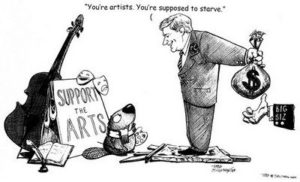
Art is both extremely appreciated in the world and under appreciated; while there seems to be a public interest in art and what art can do for people, there is an obvious lack of interest in the funding of those who create—fortunately, there exist ways of leaping over that boundary today.
There two particular reasons for the difficulty pursuing a career in art and succeeding: there are a lot of people trying to pursue this career path and there are only a limited amount of opportunities for financial stability as an artist—though with things like the internet, artists are certainly gaining more chances to pursue art and succeed financially. Beyond the help of the internet, there has been one position that has helped musicians and artist pursue their desires for a fairly long time known as teaching.
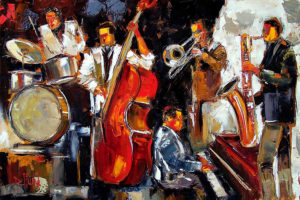
The life of most musicians and artists today consists of a constant grind and combination of making connections, gigging or performing, and teaching—typically, the most stable part of this combination is teaching. The option to teach is a gift which enables musicians to support themselves financially as they try and pursue the creation of music or visual art, as well as the continuation of the music tradition—of course, there also exist those who want to teach the future generations the tradition of art.
Continue reading “Power In The Internet; An Artist’s Dilemma”
Sons of New Orleans: An Account on Katrina
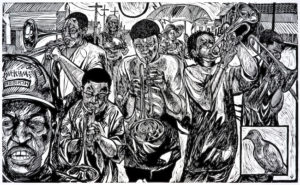
This post will serve as more insight into the lives of the people from New Orleans and how they were affected by Hurricane Katrina, specifically from the perspective of a New ‘Orleanian’. I talk about Wynton Marsalis, a huge influence from New Orleans on the Jazz music created today—Marsalis is an American virtuoso trumpeter, composer, teacher, and the director of Jazz at Lincoln Center in New York City. I also discuss Steve Prince’s perspective briefly and his public thoughts on Hurricane Katrina—I refrain from extreme detail on their personal accounts, because I find it difficult to use their personal accounts on such a tragic and impactful event.
In 2005, the natural disaster Hurricane Katrina hit the United States; on August 29th 2005, the center of Hurricane Katrina passed southeast of New Orleans. The event was a travesty; Katrina impacted the United States, and of course those who were born in New Orleans. It was a significant loss to our history, our culture, and of family. Of the people who were impacted by the event, many were artists including: Steve Prince and Wynton Marsalis. Both individuals, as sons of New Orleans responded to the event; Prince responded with his words and art and Marsalis responded with his words and music. Continue reading “Sons of New Orleans: An Account on Katrina”
To Seek Discomfort
The state of uncomfortability is something most people are afraid of, it often  restrains their actions and subsequently limits them from all the possibilities they may take. There are many paths and decisions that people can make; if half of those decisions are cut off prematurely because of a fear of discomfort, we would lose half the opportunities we have. This fear of judgement and failure we create is simply a protective barrier keeping us from the opportunity to grow—I don’t discredit fear, as it is a natural feeling, but I believe taking power over our fear of an uncomfortable situation can be empowering. In order to take full advantage of our options, we must seek discomfort.
restrains their actions and subsequently limits them from all the possibilities they may take. There are many paths and decisions that people can make; if half of those decisions are cut off prematurely because of a fear of discomfort, we would lose half the opportunities we have. This fear of judgement and failure we create is simply a protective barrier keeping us from the opportunity to grow—I don’t discredit fear, as it is a natural feeling, but I believe taking power over our fear of an uncomfortable situation can be empowering. In order to take full advantage of our options, we must seek discomfort.
Continue reading “To Seek Discomfort”
An Appreciation for The Process
The Process
We often aim for specific results and in that desire to achieve that result,  forget to appreciate “the process” or journey we took in trying to accomplish that result—people often allow the desire for a result or the disappointment from the lack of a result blind them from the wonders of process. Whatever the result is, should we achieve our desired goal or not, the process offers us valuable growth, reflection, and experience which we should appreciate just as strongly as our initial goal.
forget to appreciate “the process” or journey we took in trying to accomplish that result—people often allow the desire for a result or the disappointment from the lack of a result blind them from the wonders of process. Whatever the result is, should we achieve our desired goal or not, the process offers us valuable growth, reflection, and experience which we should appreciate just as strongly as our initial goal.
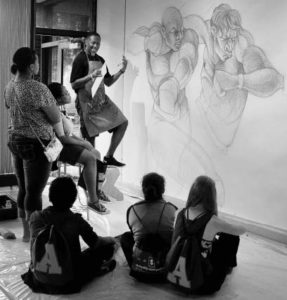
Steve Prince, an educator and art evangelist from New Orleans who utilizes printmaking, drawing, and sculpting as mediums to tell stories, is an individual who strongly emphasizes the benefits of the process behind a goal, as well as the growth and experience that occur with alongside this process. As a storyteller who utilizes significant historical context, his process of pasting and working context together is more rewarding than the product—of course, working with a goal in mind is important, I don’t mean any discredit to the application of goals. The interactions I have had with Steve Prince that have helped me arrive at a better understanding of the benefits and weight of the process, they include: the SUNY Geneseo Urban Garden collaborative art Project which Steve Prince facilitated at the beginning of the semester and the jazz/art collaborative work between Prince and the Freedom Trio that same week. Continue reading “An Appreciation for The Process”
Spirituals and the Nationalistic Music of the United States
Spirituals and the Nationalistic Music of The United States
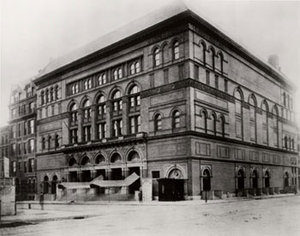
Alongside the early stages of the development of Western music in the Americas during the late 1800s came the global desire to establish national boundaries; music was one particular area where countries wanted to display their national pride and establish their nationality. The Americas, particularly the United States, was at an awkward stage in the development of its own nationalistic music, as it was not clearly established what “American music” was at this point. Eventually, a composer from Prague alongside the National Conservatory of Music, founded by Jeannette Meyers Thurber, in the United States would help push the majority of the country see that “American music” was to be built off the country’s foundation: the music and rhythms of the indigenous people and African Americans—this American music consists of the African American spirituals that WEB DuBois discussed in The Souls of Black Folk; this post serves to give some more context around the spirituals that emerged from traditional African songs that were passed down from the very first slaves in the U.S.
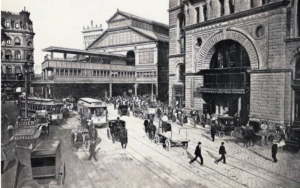
By the late 19th century, when the United States was trying to establish its own music, European music had already been established in the several countries, making the creation of their nationalistic music simple and original. American music, however, was in its early stages of development, leaving the people of the United States reliant on the more established European classical music (Grout, 2019). The study of music was also extremely dependent on European music; people from the United States started traveling to Europe in order to study music there—after placing European music at the center of music, many people then tried to imitate this music and during the era where national boundaries were rising attempted label it as America’s nationalistic music, in spite of the music that already existed in the United States. Continue reading “Spirituals and the Nationalistic Music of the United States”
